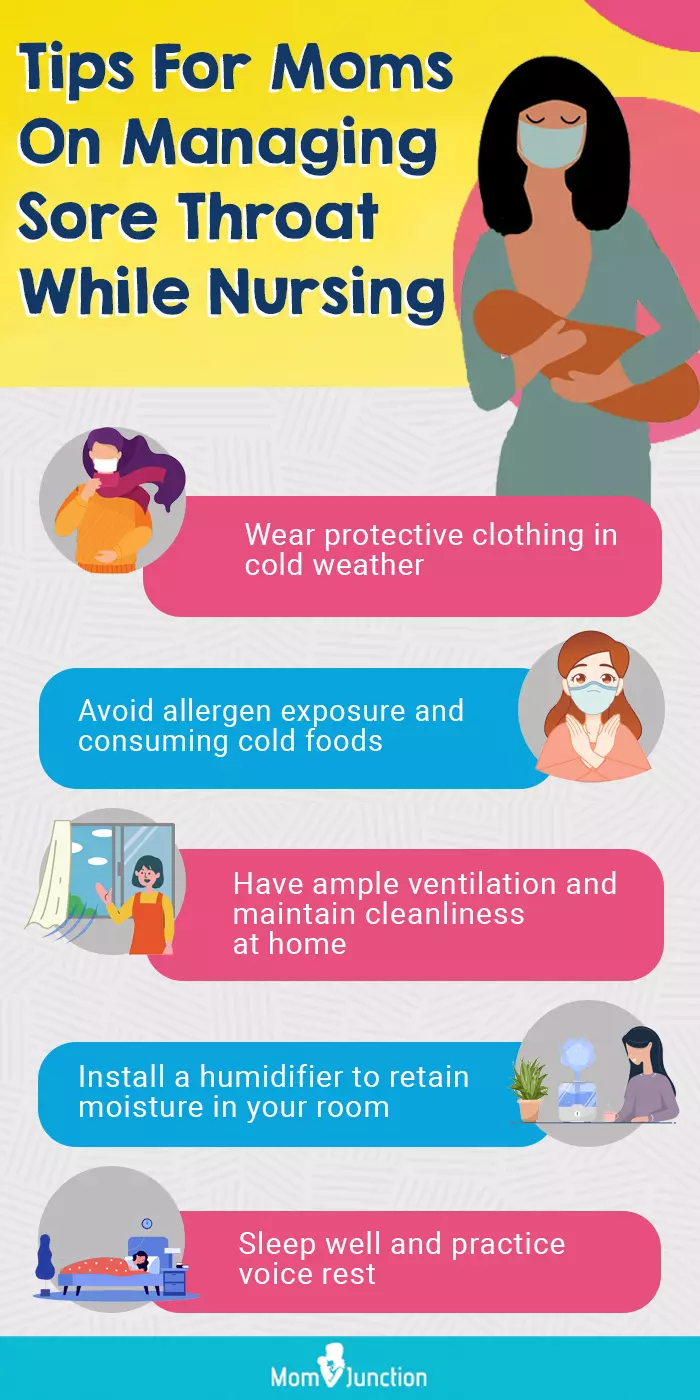
Image: ShutterStock
Breastfeeding is a natural instinct for all moms, and most women enjoy interacting with their babies while doing so. However, if you have a fever or sore throat while breastfeeding, you may be concerned about feeding your little one. This is a genuine concern since infections can transfer from a mother to an infant.
You may be amazed to know that sickness is the best time to continue breastfeeding. Antibodies created by the mother’s body in response to illness can be passed on to the baby, preventing sickness in the infant. Even if the baby does get sick, the illness will not be severe since they would have already received antibodies from the breast milk (1).
Keep reading to learn more about sore throats and breastfeeding, as well as some useful home remedies to help you feel better.
Key Pointers
- A sore throat is a typical sign of bacterial or viral infections, caused by throat dryness, allergies, irritating exposure, muscular strain, and GERD.
- Medical care is necessary for symptoms such as high temperature that don’t lower after a week or specific risks like spleen removal or anti-thyroid medication.
- Throat rinses, anesthetic throat sweets or sprays, and over-the-counter pain relievers are possible treatments for sore throats when nursing.
- During sickness, milk production may decrease, but it will soon increase again.
- Gargling with salt water and drinking lemon-honey water are two straightforward home treatments for a sore throat when nursing.
Causes Of Sore Throat

A sore throat is a pain or irritation in the throat, and is a symptom of viral infection, bacterial infection or a cold. Causes of sore throat include:
- Viral infections like influenza and common cold. However, it may also be due to viral diseases such as mononucleosisiA contagious viral disease transmitted by bodily fluids such as saliva that may cause sore throat and fever , chickenpox, measles, etc.
- Infections spread by bacteria such as the streptococcus pyogenes or group A streptococcus. According to the US Centers for Disease Control and Prevention (CDC), group A Streptococcus causes approximately 5% to 15% of sore throats in adults. However, sore throat can also be a symptom of other bacterial diseases like acute pharyngitis (strep throat), whooping cough or diphtheria.
(strep throat), whooping coughiA severe respiratory illness manifesting as a persistent cough with a high-pitched “whoop” sound or diphtheriaiA bacterial infection that affects the nose and throat, thereby causing breathing and swallowing difficulties . - Other causes of sore throat include allergies, dryness of throat, exposure to irritants, muscle strain, and gastroesophageal reflux diseaseiA chronic gastric condition where the stomach acids move backward into the food pipe, leading to heartburn (GERD).
Symptoms Of Sore Throat
A sore throat can be accompanied by tender glands in your neck and throat, swollen tonsils (tonsillitis), and pain while swallowing.
You may also have a headache, temperature, pains, and general aches.
Other symptoms include dryness in the throat, white patches of pus on your tonsils, hoarseness of voice, chills, cough, runny nose, sneezing, nausea or vomiting.
When To Seek Medical Help?
Medical attention is not immediately required for a sore throat. According to a UK study that involved people who took GP appointments for a sore throat, 50% cases settled within a week of the onset of illness, while 80% cases took ten days. It is advisable to seek medical help, in circumstances like:
- Persistent high temperature above 38C (100.4F)
- If the temperature does not go down with medication
- Symptoms remain same for a week
- If you have specific risks like spleen removal or anti-thyroid drug consumption
Diagnosis
Symptoms indicate that your throat is sore. In case you seek medical advice, the doctor performs a physical examination of the throat, nasal and ear passages. He will look for the signs of swollen glands in the neck or jaw. You may have to undergo complete blood count, a throat swab, and allergy tests to identify the exact cause.
Treatment For Sore Throat During Breastfeeding
The course of treatment prescribed by your doctor depends on the cause of soreness in your throat. It is safe to take most medicines while nursing. Unless it is a severe case, or you are considered to be at a higher risk of severe infection, antibiotics are not prescribed to treat a sore throat. Treatments compatible with breastfeeding are:
- Over-the-counter painkillers like paracetamol or ibuprofen for relief from temperature and general aches.
- Anesthetic throat sweets or throat sprays for relieving pain. Throat rinses can also be helpful. It is advisable to avoid sprays and lozenges containing hexylresorcinol or phenol. Select cepacol lozenges, celestial seasonings or something similar, which has menthol and/or benzocaine. Sucrets lozenges containing dyclonine are better than those with hexylresorcinol. Too much menthol tends to reduce milk supply. Avoid cough drops with menthol.
 Be watchful
Be watchful- Different forms of Delsym, Robitussin and Benylin are considered compatible with lactation. It is better to check for active ingredients before using.
- Avoid medications containing decongestants as they tend to reduce milk supply.
*Note:
Talk to your doctor before taking any supplements or medicines during breastfeeding to understand their compatibility with breastfeeding. Your milk supply may decrease during or after the illness, probably due to drugs, but will build back soon.
Sore Throat Home Remedies For Nursing Mothers
Simple home remedies are efficient in healing a sore throat. Many natural remedies for a sore throat are compatible with breastfeeding. A few of them are:
- Salt water gargle: Sore throat can cause throat pain during pregnancy. You can relieve this pain with a salt water gargle. It is a simple yet efficient treatment. Dissolve two teaspoons of salt in a cup of hot water, gargle and spit. Repeating it frequently throughout the day to get the desired results.

- Lemon-honey water: Squeeze one lemon into a glass of warm water, mix two teaspoons of honey and drink slowly or sip. Yes, honey is not advisable for babies less than one-year-old, due to the risk of infant botulismiA rare but severe food poisoning caused due to toxins produced by bacteria named Clostridium botulinum but there is no known risk if a nursing mother consumes it.
- Sucking on an ice cube, or a throat lozenge, or pastilles, or raisons, or drinking teas like black tea, ginger tea, etc. are all beneficial. All these help in keeping the throat moist and giving a demulcent effect.
- Steam inhalation: Regular steam inhalation can relieve dryness and nasal congestion. You may have it with menthol crystals.

- Water and apple-cider vinegar gargle: Mix two tablespoons of vinegar in a glass of water. You may add more vinegar if needed. Gargle and spit. Do it frequently during the daytime.
- Slippery elm bark: It can offer relief from a cough and sore throat. Consume throat lozenges and herbal cough drops, which have slippery elm bark. Or it can be made as a tea by boiling one to three teaspoons of powdered bark per cup of water. Have three cups of it each day.
- Licorice root and marshmallow root teas: According to the Journal of Alternative and Complementary Medicine, a proprietary tea blend of slippery elm bark, licorice root and marshmallow would relieve a sore throat for half an hour.
- Chamomile tea: You may gargle or drink it.
- Warm fluids: Consume warm fluids like drinks or soups to lessen the itchiness and irritation in the throat. They also increase the functionality of your immune system and boost your nutritional intake.
- Cinnamon tea: Another useful spice that may help soothe your throat. You can have cinnamon either as a herbal tea or just add ground cinnamon powder or cinnamon sticks to your black tea.
- Oatmeal: A bowl of warm oatmeal that is mushy in texture and hence easy to swallow would be a good meal option while suffering from a sore throat. You can also add honey and any pureed fruit for more taste.
- Hydration: Drink plenty of water and other fluids rich in electrolytes to keep yourself hydrated. It is recommended to drink at least 8-10 glasses of water daily to soothe your sore throat and maintain adequate breast milk supply.
 Expert says
Expert saysPrecautions To Take While Breastfeeding With Sore Throat
Note that in most cases, illness is not transmitted through mother’s milk. It transmits through the secretions from the nose and mouth, and skin contact.
Dr. Mykale Elbe, a family nurse practitioner from Mascoutah, Illinois, says, “Breast milk will provide your child antibodies to whatever is causing your sore throat. This, in turn, will help them fight off infections.”
To avoid the possibility of your baby getting sick:
- Wash your hands often.
- Avoid face-to-face contact or sneezing near the baby.
- Cover your mouth while coughing or sneezing.
- You can also wear a filtering mask while nursing your little one.
- Instead of holding the baby, ask somebody to place him beside you on the bed for you to breastfeed. After nursing, let them take care of the baby so that you can rest.
12 Tips For Nursing Mothers With Sore Throat
In addition to home remedies, change your routine to include the below in it. You will get some relief from sore throat:
- It is important to maintain hydration by drinking plenty of water and other fluids.

- Run a humidifier and have hot water baths.
- Take foods or supplements containing vitamin C.
- Avoid cold weather and wrap a woolen scarf around the neck.
- Have echinacea and zinc supplements. They are considered safe for nursing mothers.
- Raw garlic is the best, but you may also consume cooked garlic or a supplement. It is proven that babies consume more milk when moms consume raw garlic.
- Homeopathic medicines are helpful.
- Do not keep the room overheated with a dry atmosphere.
- Avoid visiting places that are high on allergens like pollens, dust, pollution, etc.

- Ventilate your home, keep it dust and smoke-free.
- Sleep well and practice voice rest to reduce your discomfort.
- Avoid sharing utensils with your baby.
A sore throat is a common ailment, and will not harm your child if you are breastfeeding him during this time. Continue to build immunity in him and develop that incredible bonding with your little one without any hesitations. However, take precautionary measures.
Frequently Asked Questions
1. Why is abrupt weaning not good?
Abrupt weaning is never a good idea. Very rarely a breastfeeding mother may have to stop nursing due to illness. Ordinary illnesses like flu, sore throat, cold, fever, etc. should not stop you from nursing. Abrupt weaning could result in engorgement and mastitis, besides potential emotional distress to both you and the baby. Additionally, it deprives the baby of superior nutrition and comfort.
2. How long am I contagious if I have a sore throat?
When you have a cold, you are typically infectious one or two days ahead of the appearance of your symptoms, and you may continue to be contagious for the duration of your symptoms, rarely for up to two weeks (4). It is advisable to visit a doctor when the condition exceeds for more than a week or two.
3. What drinks should I avoid when I have a sore throat?
If you have a sore throat, you should avoid citrus juices, carbonated and caffeinated beverages, and alcoholic drinks (5).
4. Can ice cream help with a sore throat?
Cold treats such as ice creams may help to soothe your sore throat (6).
5. What are the foods that can aggravate sore throats?
Greasy, spicy, and acidic meals may aggravate sore throats. Moreover, the intake of foods with crunchy consistency, such as dry toast or cereal, might irritate your already vulnerable throat (5).
A sore throat while breastfeeding may cause concern as you must be worried about your child being exposed to infection. Also, you should be careful about the kind of treatment you go ahead with, as it might affect the baby. Some natural ways to cure a sore throat are salt water gargling, lemon-honey water, and sucking an ice cube. However, if your problem persists, you must pay a visit to your doctor. You may also avoid sharing utensils with your little one and ensure cross ventilation in all rooms to prevent infection from spreading.
Infographic: Ways To Deal With Sore Throat While Breastfeeding
Sore throats need not always be due to underlying diseases and often resolve without medication. So, if you are concerned about a sore throat during breastfeeding, do not pop a pill; instead, follow specific home remedies to manage your symptoms. This infographic suggests helpful ways to deal with a sore throat while breastfeeding. Illustration: Momjunction Design Team
Learn how to treat strep throat while breastfeeding with natural home remedies. Equip yourself with the knowledge on how to prepare and use these remedies that can soothe your throat and provide effective relief.
References
- Breastfeeding through colds and flu.
https://breastfeedingusa.org/breastfeeding-through-colds-and-flu/ - Medicines In Breastfeeding.
https://www.thewomens.org.au/images/uploads/fact-sheets/Medicines-in-breastfeeding-151018.pdf - 6 At-Home Remedies to Ease Your Sore Throat.
https://www.pennmedicine.org/updates/blogs/health-and-wellness - Am I still contagious?
https://www.cedars-sinai.org/blog/am-i-still-contagious.html - Nutrition Tips for Managing Sore Mouth Throat and Tongue.
https://www.lls.org/sites/default/files/National/USA/Pdf/PearlPoint/PearlPoint_Nutrition_Tips_for_Managing_Sore_Mouth__Throat__and_Tongue.pdf - Self Care for a Sore Throat.
https://www.rush.edu/news/self-care-sore-throat
Community Experiences
Join the conversation and become a part of our nurturing community! Share your stories, experiences, and insights to connect with fellow parents.
Read full bio of Dr. Priya Shashank
- Dr. Mykale Elbe is the director of the MSN Nurse Practitioner Program and assistant professor of Nursing at Maryville University. She earned her BS in Nursing and MS in Nursing with a concentration in Family Nurse Practice from Saint Louis University.
 Dr. Mykale Elbe is the director of the MSN Nurse Practitioner Program and assistant professor of Nursing at Maryville University. She earned her BS in Nursing and MS in Nursing with a concentration in Family Nurse Practice from Saint Louis University.
Dr. Mykale Elbe is the director of the MSN Nurse Practitioner Program and assistant professor of Nursing at Maryville University. She earned her BS in Nursing and MS in Nursing with a concentration in Family Nurse Practice from Saint Louis University.
Read full bio of shreeja pillai
Read full bio of Rohit Garoo
Read full bio of Shinta Liz Sunny



















